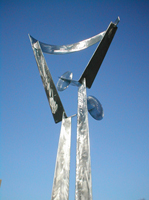
Bryn Mawr College

 |
Center Bryn Mawr College | 
|
September 11
Ralph Kuncl
"The
Balkanization of Science"
Colleagues then asked about the possibility of telling the story differently, about what kind of role small colleges like Bryn Mawr might play in correcting this system, and about the preference for having research that is investigator-driven. There may be no novel ideas, but (with low levels of proof) there are certainly still patentable ones. Humanists, like scientists, find themselves in competition for scarce resources. Do we want to think of teaching as an outcome of research that is commodifiable? Do we want to think about capitalizing on pedagogical inventions? Would we be contributing (and do we want to contribute) thereby to the objectification to knowledge? Might we be more appreciative of applied work? Is our desire to avoid capitalizing on the knowledge we produce a false one? Should we grant space for less profitable activities, or create profits that we can all share, following communist rather than capitalist models? What alliances with local busnesses (via internships, etc.) do we want to make? Might there be mutual self interest, for instance, in leadership training @ the college?
Or (these questions arose in conversations among several of us after lunch ended) might there be an alternative economics for conceptualizing the kind of work we do? Might there be different conceptions of knowledge than those of ownership? Rather than producers of knowledge (for instance) might we think of ourselves as service providers? What IS the most empowering image available to us, for the kind of work we do? For the kind of work we would LIKE to be doing?
Those who participated in this initial conversation, as well as those who are just joining us now, are warmly invited to continue the discussion our on-line forum, and to join us next Wednesday for its continuation. Samantha Glazier will pick up the conversation with some comments on "Isolation, Persuasion and Conviction: Sustaining the Culture of Science." Sam will be talking about the various ways in which she is responding to her own socialization into the culture of science. She is a Keck Fellow in Chemistry who has been working w/ Sharon Burgmeyer to learn more about how and which metal compounds modify DNA.
Home
| Calendar | About
| Getting Involved
| Groups | Initiatives | Bryn Mawr Home | Serendip Home
Director: Liz McCormack -
emccorma@brynmawr.edu
| Faculty Steering Committee
| Secretary: Lisa Kolonay
© 1994-
, by Center for Science in Society, Bryn Mawr College and Serendip
Last Modified:
Wednesday, 02-May-2018 11:57:05 CDT